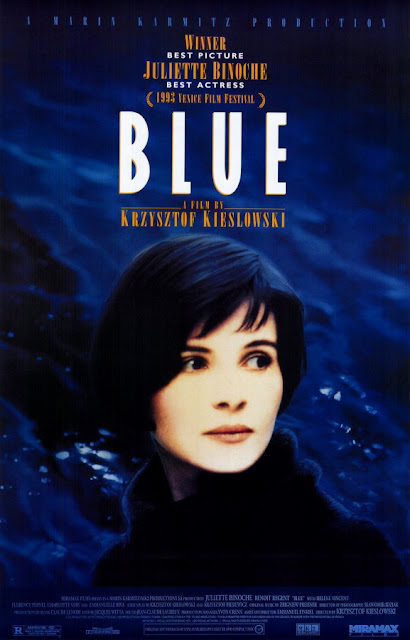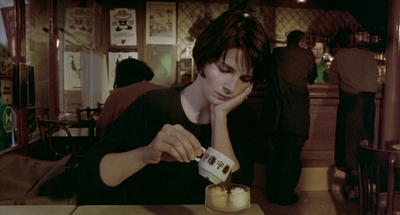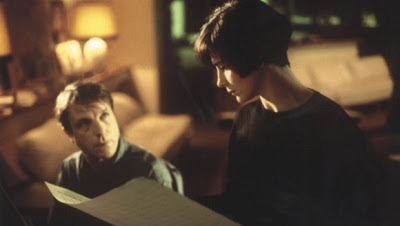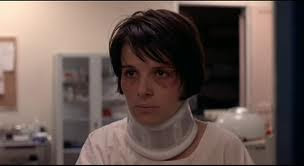A film on 1 Corinthians Chapter 13 - a Biblical chapter on love & maturity
A Potpourri of Vestiges Review
Featured in IMDb Critic Reviews
Summary: First of a trilogy of films dealing with contemporary French society concerns how the wife of a composer deals with the death of her husband and child.
In
Three Colors: Blue, Kieslowski tackles the subject of liberty—albeit emotional
and not political or social—through the means of a bereaved Parisian woman named Julie whose life serves to be a microcosmic representation of the contemporary human society. Julie
escapes death during a macabre car crash that claims the life of her husband
and her only child. Devastated by her colossal loss, she makes an unsuccessful
suicide attempt. After getting discharged from the hospital, with the hope of
curtailing her tribulation, she deliberately tries to seclude herself from
whatever is left of her former life. But, the more she tries the more she finds
her incapable of freeing herself from the human connections. Kieslowski
succeeds in projecting liberty as an emotional paradox: the more one yearns for
it the more one gets entangled in the endless uncertainties of life.
Kieslowski's
cinema, propagated by its subtle use of metaphors, allegories and symbolisms, is
noted not for its sustained grandeur but for its fragmented moments of brilliance.
And the metaphysical, theological and spiritual allusions are so deftly blended
that a less keen viewer may easily overlook them. Music plays a pivotal part in
Kieslowski's cinema. The real beauty of his cinema is its deceptive simplicity that’s
augmented by abundance of colors and the dearth of dialog. Little by little,
the viewer is sucked inside this painfully plain world until he becomes a part of
it. And his reclusive characters merely serve the purpose of mirrors while
their futile actions are a means to help us identify our follies. Three Colors:
Blue has all the elements of quintessential Kieslowski cinema. Behind the
veneer of simplicity lies a profound work of cinema that bears witness to Kieslowski’s
cinematic genius. It’s indeed sad that Kieslowski died at a young age of 54,
just two years after the completion of The Three Colors Trilogy, leaving behind
a legacy of excellence for the future generations of filmmakers.
Krzysztof
Kieslowski's Three Colors: Blue is an endlessly fascinating work of cinema whose
brilliance, I daresay, is paralleled only by the best works of Bergman, Bunuel,
and Tarkovsky. Juliette Binoche (the fact that she chose Three Color: Blue over Jurassic Park speaks volumes about her) is mesmerizingly brilliant in her portrayal of a reclusive widow
and is well backed up by the rest of the cast. Zbigniew Preisner’s evocative
music immensely adds to the poignancy of the movie. Here, I would like to make a special mention of a beautiful song about hope, faith, and love played around the end of the movie that exalts love as the greatest of the three. Kieslowski, an agnostic, borrowed the song's lyrics from a chapter of the Bible, 1 Corinthians Chapter 13, a chapter on love and maturity which also forms the basis of Blue. These Biblical verses have been used again and again by filmmakers over the years: be it master Swedish filmmaker Ingmar Bergman in Through a Glass Darkly (1961), British director Roland Joffe (screenplay by Robert Bolt) in his Palme d'Or winning film The Mission (1986), or Russian filmmaker Andrei Zvyagintsev in The Banishment (2007). Slawomir Idziak’s highly detailed
cinematography gives a whole new life to the movie and helps bring the characters
to life. Kieslowski, through his epic trilogy, succeeds in inventing a whole
new language of cinema: one that’s so subtle and yet so evocative, so minimal
and yet to powerful, so definitive and yet so difficult to express. And while
the casual viewer may remain untouched by its sheer power the keen-eyed
viewer is bound to be devastated by the impact it creates on his intellect and psyche. Blue serves as a great overture to what lies in store for
the viewers in the trilogy’s relatively more complex installments that follow it: White
and Red. Highly recommended!
P.S. Three Colors: White has also been reviewed on this blog.
Readers, please feel free to share your opinion by leaving your comments. As always your feedback is highly appreciated!
References:
Previous Review: A Pure formality (1994)
Next Review: Life of Pi (2012)
A Potpourri of Vestiges Review
Featured in IMDb Critic Reviews
 |
| Three Colors: Blue (1993) - By Krzysztof Kieslowski |
Our Rating: 9.5
IMDb Ratings: 7.6
Genre: Comedy | Drama | Mystery
Cast: Juliette Binoche, Benoît Régent, Julie Delpy
Country: France | Poland | Switzerland
Language: French
Language: French
Runtime: 98 min
Color: Color
Summary: First of a trilogy of films dealing with contemporary French society concerns how the wife of a composer deals with the death of her husband and child.
Three
Colors: Blue (1993) is the first installment in iconic Polish filmmaker
Krzysztof Kieslowski’s highly acclaimed ‘Three Colors’ trilogy loosely based
on the French ideals of liberty, equality and fraternity as represented by the
French tricolor—the next two being Three Colors: White (1994) and Three Colors:
Red (1994), respectively. The screenplay of all the three films in the trilogy
was co-written by Kieslowski and his longtime collaborator Krzysztof Piesiewicz. The "Three Colors" trilogy is widely considered as Kieslowski’s
greatest work along with his ‘Decalogue’—a ten-episode television series
with each of the ten episodes trying to explore and interpret one of the Ten
Commandments through the means of a short fictional story. In fact, a very few
would disagree that the ‘Three Colors Trilogy’ and the ‘Decalogue' are two of
the greatest and most consummate manifestations of human expressions in the
whole of cinema.
 |
| Juliette Binoche as Julie in Three Colors: Blue |
 |
| A Still from Three Colors: Blue |
 |
| A Still from Three Colors: Blue |
 |
| Juliette Binoche in Krzysztof Kieslowski’s Three Colors: Blue |
P.S. Three Colors: White has also been reviewed on this blog.
Readers, please feel free to share your opinion by leaving your comments. As always your feedback is highly appreciated!
Three Colors: Blue (1993) Trailer
Previous Review: A Pure formality (1994)
Next Review: Life of Pi (2012)
People who liked this also liked...








Another excellent post Murtaza,
ReplyDeleteIt's hard for me to pick my favorite of the three. It alternates between this and Red, usually depending on which one I've most recently seen. But I agree this is a true masterpiece rivaled only by those greats.
Binoche breaks my heart every time, Priesner's score could be the most majestic ever written, and there are no words for Idziak's cinematography.
Also, if I could have any one piece of movie memorabilia in the history of film, I would probably choose that crystal chandelier.
Thanks Bonjour... I am really glad that you like it!!! For some inexplicable reason, White happens to be my favorite among equals. Binche simply steals the show with her perfect portrayal. The music and cinematography are just so sublime. And, yes, the blue crystal chandelier is a hell of a movie memorabilia to keep :-)
ReplyDeleteI love each part of the colors trilogy, but blue might be my favorite. Great review, you really captured it well!
ReplyDeleteThanks Brent... I am really glad that you liked it. Btw, my favorite movie among equals is White!!!
ReplyDeleteExcellent post Murtuza. Binoche always has been a wonderful actress. Thanks for reminding me about this film. It has been on my to watch list since a long time. Your post has made me all the eager to watch it. So many movies still remain to be watched. I guess a lifetime is ain't enough for them .
ReplyDelete